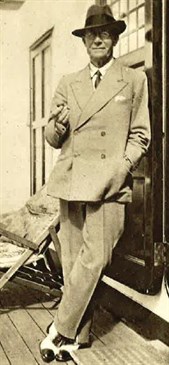
Frederick William Pascoe Rutter came from a poor family in Liverpool and his education at Liverpool College was funded entirely through scholarships. Anticipating that he would not be able to attain further scholarships to pursue a university education, he left school at 14 to start work at the London & Lancashire Insurance Company, as an apprentice.
At 26 he was made the head of the foreign department; at 28, assistant company secretary and at the age of 30 he was sub-manager. By the age of 40 he was general manager and secretary of the company and over the next 22 years he increased their income by a factor of seven.
1917 saw Sir Frederick being made a director of ‘the L&L’ and three years later, on his retirement, he was made governor and chairman of the company he had worked at for nearly half a century. In 1948 he was made a ‘life governor’ in recognition of his long and dedicated service. Sir Frederick’s often-avowed personal motto was per ardua surgo – ‘rise through adversity’.
Sir Frederick was heavily involved in the Institute movement and was President of the Insurance Institutes of Great Britain and Ireland for 1910-11 – this while it was in the process of developing its Charter. His dedication to what became the CII was very personal and, in 1928, he hosted the CII Conference at his own home, Coombe Ridge. Sir Frederick was always willing to put his money where his mouth was. Following the appeal he made in his 1911 presidential address for prizes to be awarded to candidates, he personally donated £200 (the equivalent of c.£21k) to this end, and continued regularly to donate large sums for the rest of his life – in fact the ‘Rutter Medal’ is still awarded each year to this date.

After his 1919 speech, ‘The Chartered Insurance Institute: its Right to Work’, in which Sir Frederick proposed the building of a central home for the CII, he regularly donated a significant amount of money from the London & Lancashire Insurance Company and his own personal wealth, until this was achieved. Sir Frederick was appointed to chair the committee created to establish a permanent home for the CII and he was present in 1934 when the insurance hall was opened by King George V. A few weeks earlier he had been knighted in His Majesty’s Birthday Honours.
Although Sir Frederick considered his work to be a recreational activity, his personal interests were many and various: he was a keen global traveler, both for work and pleasure, and published a book about his travels in 1921 – with all proceeds going to the Insurance Clerks’ Orphanage.
Sir Frederick believed himself to have telepathic abilities but believed this to be an unexplored aspect of neuroscience, rather than related to spiritualism, as he had a particular interest in human biology. His interests also extended to the arts and he wrote for the Musical Times, as its Liverpool correspondent, in his 20s. He read widely and had an extensive personal library, as well as a collection of art and antiquities. His interest in oratory and rhetoric led him to become secretary of a debating society and he was a popular public speaker at insurance industry events. Several of his addresses were later published as monographs and he also published a conversational autobiography in 1937, with all proceeds going to the Insurance Clerks’ Orphanage and the Insurance Benevolent Fund (now the Insurance Charities).
On his death in 1949 Sir Frederick Rutter was eulogised in the Times and Post Magazine as “the doyen of British insurance leaders and a remarkable personality”.


